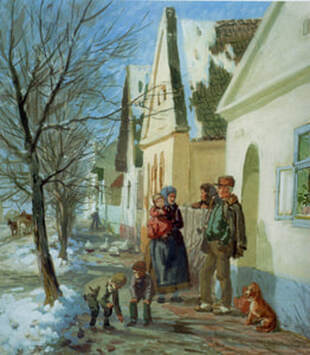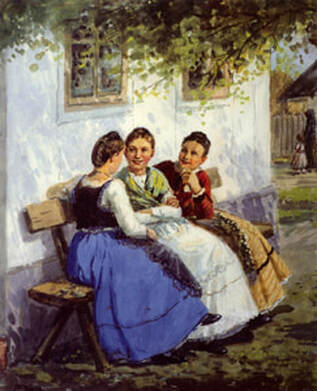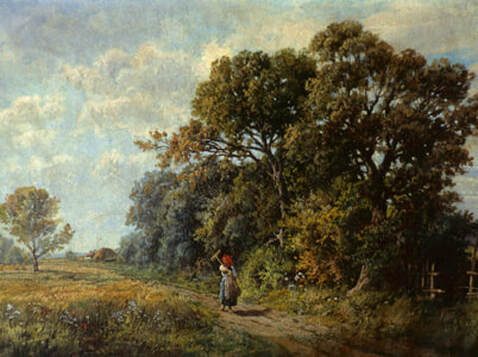Francis Berger's Blog, page 24
June 17, 2024
Random Thoughts as Midsummer's Day Approaches
I suppose it’s superfluous to point out that the very same leaders, managers, and experts who insisted on shutting down the world back in 2020, even if it meant saving just one life, are now virtually all on board the “let’s have a great big war” train.
I have nothing but respect for roofers. I spent a day shingling a 4x3-meter shed roof, and I cannot tell you how relieved I was to come down from the roof at the end of that day. Not because I suffer from any acrophobia but because roofing is demanding work. On the one hand, nailing shingles to boards is easy. On the other hand, the prolonged kneeling, squatting, craning, and climbing is quite taxing, to say nothing of the heat the shingles emit after the sun reaches a certain point in the sky. I have shingled many roofs in my time, and it never gets easier! I could not imagine doing that kind of work day in, day out. So, hats off to all the roofers in the world!
The five new 12-week-old pullets I ordered in winter arrived last week. I set them up in a separate part of the run, and they appear to be doing great; however, they refuse to go into their coop at dusk and do everything short of tunneling to join the adult flock in its coop. I had to pick them up and carry them in the first five nights. I now coax them into the coop with my hands, but it would be much more convenient if they went in alone. Kids these days!
I guess it rarely occurs to most conservative, reactionary, counter-revolutionary types that August Comte inherited the idea of society über alles from traditionalist stalwarts such as De Maistre and De Bonald.
People avidly hire life coaches when they should be seeking a reputable death coach.
Professional development sessions must fall under the jurisdiction of an incessantly malevolent class of demons specializing in ennui, inanity, torpor, and mindnumbing team-building starter activities. Has anyone out there ever attended a beneficial or engaging professional development session? Those answering in the affirmative should immediately seek the aid of an exorcist.
I have nothing but respect for roofers. I spent a day shingling a 4x3-meter shed roof, and I cannot tell you how relieved I was to come down from the roof at the end of that day. Not because I suffer from any acrophobia but because roofing is demanding work. On the one hand, nailing shingles to boards is easy. On the other hand, the prolonged kneeling, squatting, craning, and climbing is quite taxing, to say nothing of the heat the shingles emit after the sun reaches a certain point in the sky. I have shingled many roofs in my time, and it never gets easier! I could not imagine doing that kind of work day in, day out. So, hats off to all the roofers in the world!
The five new 12-week-old pullets I ordered in winter arrived last week. I set them up in a separate part of the run, and they appear to be doing great; however, they refuse to go into their coop at dusk and do everything short of tunneling to join the adult flock in its coop. I had to pick them up and carry them in the first five nights. I now coax them into the coop with my hands, but it would be much more convenient if they went in alone. Kids these days!
I guess it rarely occurs to most conservative, reactionary, counter-revolutionary types that August Comte inherited the idea of society über alles from traditionalist stalwarts such as De Maistre and De Bonald.
People avidly hire life coaches when they should be seeking a reputable death coach.
Professional development sessions must fall under the jurisdiction of an incessantly malevolent class of demons specializing in ennui, inanity, torpor, and mindnumbing team-building starter activities. Has anyone out there ever attended a beneficial or engaging professional development session? Those answering in the affirmative should immediately seek the aid of an exorcist.
Published on June 17, 2024 12:55
June 12, 2024
Two Ways of Understanding Apocalypse
An especially useful tidbit I gleaned from Berdyaev is that there are two ways of understanding apocalypse — a passive way and an active way.
Berdyaev observed that the passive way of understanding apocalypse has always predominated Christian consciousness via a sense of foreboding and passive waiting for the end because most Christians believe that the fate of the world is determined by God exclusively — divine judgment and all that.
From another perspective, the end of the world is not an exclusively divine matter. Man also participates in the world, be it creatively or destructively. Seen this way, the end of the world also depends on man’s activity. So, how should man approach the end of the world?
On the one hand, he can assume it is all in God’s hands and wait for the inevitable in passive terror or prepare for it actively and creatively.
According to Berdyaev, apocalyptic consciousness can be conservative and reactionary or revolutionary and creative.
The world is always coming to an end. At the same time, the world is also always beginning. The world has ended countless times in history and every time some movement in history drew to a close, another emerged.
Movements of history aside, the individual world of every person ends in a personal apocalypse. The world may continue despite everything, but we know beyond a doubt that we as individuals will not, at least not in this mortal coil.
Whether the world ends should be of secondary significance to the certainty of our mortal lives ending. How will we choose to face our individual apocalypses when they arrive? The same way we choose to face the end of the world apocalypse?
Will we stare aghast in horror at the ruin of everything we sanctified, or will we greet our inevitable demise actively and creatively?
Will we fixate on the end and see no more, or will we recognize the end as a beginning and concentrate on preparing for that beginning with creativity, hope, and love?
If we spent more time being revolutionary and creative about the inevitable end of our personal worlds, we could change the tentative end of the world into something that it ought to be.
Berdyaev observed that the passive way of understanding apocalypse has always predominated Christian consciousness via a sense of foreboding and passive waiting for the end because most Christians believe that the fate of the world is determined by God exclusively — divine judgment and all that.
From another perspective, the end of the world is not an exclusively divine matter. Man also participates in the world, be it creatively or destructively. Seen this way, the end of the world also depends on man’s activity. So, how should man approach the end of the world?
On the one hand, he can assume it is all in God’s hands and wait for the inevitable in passive terror or prepare for it actively and creatively.
According to Berdyaev, apocalyptic consciousness can be conservative and reactionary or revolutionary and creative.
The world is always coming to an end. At the same time, the world is also always beginning. The world has ended countless times in history and every time some movement in history drew to a close, another emerged.
Movements of history aside, the individual world of every person ends in a personal apocalypse. The world may continue despite everything, but we know beyond a doubt that we as individuals will not, at least not in this mortal coil.
Whether the world ends should be of secondary significance to the certainty of our mortal lives ending. How will we choose to face our individual apocalypses when they arrive? The same way we choose to face the end of the world apocalypse?
Will we stare aghast in horror at the ruin of everything we sanctified, or will we greet our inevitable demise actively and creatively?
Will we fixate on the end and see no more, or will we recognize the end as a beginning and concentrate on preparing for that beginning with creativity, hope, and love?
If we spent more time being revolutionary and creative about the inevitable end of our personal worlds, we could change the tentative end of the world into something that it ought to be.
Published on June 12, 2024 13:10
June 10, 2024
Stefan Jäger: The Norman Rockwell of My People, Who No Longer Exist
A reader made me aware of Stefan Jäger (1877-1962), a Hungarian-born painter who identified deeply with his Danube Swabian heritage and made it the focus of his work, mostly sentimental/romantic/idealized depictions of pre-World War 2 Danube Swabian life in Hungary and Yugoslavia.
If I had to classify Jäger, I would refer to him as the Norman Rockwell of my people, who no longer exist -- at least not in the manner in which Jäger depicted them.
People tend to think that I am of Hungarian heritage, but I'm actually a full-blooded Danube Swabian. Of course, that means very little these days considering that Danube Swabian culture was all but wiped from the face of the earth during and after the Second World War. Since then, the descendants have all but assimilated into other cultures.
The scenes Jäger portrays in his paintings are certainly sentimental to an extent; however, they also provide a glimpse into what Danube Swabian culture was like, something I can confirm from the many stories my grandparents told me. Village Street in Winter
Village Street in Winter  Visit from Grandma
Visit from Grandma  Chatting on a Street Bench
Chatting on a Street Bench  Courting
Courting  On the Way Home
On the Way Home  Swabian House Concert
Swabian House Concert
If I had to classify Jäger, I would refer to him as the Norman Rockwell of my people, who no longer exist -- at least not in the manner in which Jäger depicted them.
People tend to think that I am of Hungarian heritage, but I'm actually a full-blooded Danube Swabian. Of course, that means very little these days considering that Danube Swabian culture was all but wiped from the face of the earth during and after the Second World War. Since then, the descendants have all but assimilated into other cultures.
The scenes Jäger portrays in his paintings are certainly sentimental to an extent; however, they also provide a glimpse into what Danube Swabian culture was like, something I can confirm from the many stories my grandparents told me.
 Village Street in Winter
Village Street in Winter  Visit from Grandma
Visit from Grandma  Chatting on a Street Bench
Chatting on a Street Bench  Courting
Courting  On the Way Home
On the Way Home  Swabian House Concert
Swabian House Concert
Published on June 10, 2024 12:42
June 9, 2024
The Everyone is a Heretic But Me Routine Misses the Point About Heresy Today
Nothing bores and disappoints me more than bloggers who insist that they are truly orthodox and that nearly everyone else is a heretic. This short Emo Philips gag helps explain why to some degree. To begin with, that level of discernment and judgment and its obsessive fixation on wrongthink as it pertains to adhering to externals hovers at about the same level as that utilized by the most raving, foaming-at-the-mouth leftist true believers.
Screaming heretic from the rooftops is not an argument any more than screaming racist or transphobe is an argument. It does not exemplify sound or creative thinking, reflects no modicum of internal spiritual movement or development, and sidesteps all the serious spiritual issues Christians should urgently concern themselves with today.
First off, the accused is probably already fully aware that he is indeed a heretic according to the doctrine against which he is judged, so what exactly is the point of stating the obvious? It would be like screaming American at a person who understands that he is a citizen of the United States.
Also, what many heretic accusers fail to understand is that the accursed heretic standing before them may very well be perfectly orthodox in the tradition that he follows, a tradition that informs him that his accuser, not he, is the real heretic. Hours of meaningful and engaging dialogue follow.
Then there is the whole issue of Christians labeling people as heretics even though they switched denominations, sometimes more than once, meaning that such Christians were themselves heretics at some point. You would think that such individuals would have more sympathy for others’ spiritual journeys. But no, on the contrary, they are frequently among the most smug, arrogant, and vitriolic of true believers.
Of course, we must not forget all the heresy accusations liberally being tossed about within one tradition or denomination. Don’t accept the current pope as valid? Heretic! Accept the current pope as valid? Heretic!
And then there are the lowest of the low on the heretic ranking chart —the unaffiliated Romantic Christians like me who are generally dismissed as non-Christian or, sometimes, even anti-Christian because we insist on making our own way rather than submitting to one of the established denominations or traditions.
The most common dismissal against such an individualized approach is that it is too subjective. Christians are permitted some idiosyncrasy within the religion; however, the level of subjectivity, discernment, and choice of an individualized approach disqualifies it as Christianity because at the end of the day, Christianity is a program — or a selection of programs — and the whole point of being a Christian is getting with a program.
Yet getting with a program involves choice and discernment — yes, even for cradle Christians. The root meaning of heresy stems from the Greek hairesis “a taking or choosing for oneself, a choice, a means of taking; a deliberate plan, purpose; philosophical sect, school.”
Choosing for oneself can involve submitting to one of the established traditions or eschewing all of them and going it alone. Either way, it’s choosing for yourself, entailing that all Christians today are heretics, regardless of whether they acknowledge that or not.
Screaming heretic from the rooftops is not an argument any more than screaming racist or transphobe is an argument. It does not exemplify sound or creative thinking, reflects no modicum of internal spiritual movement or development, and sidesteps all the serious spiritual issues Christians should urgently concern themselves with today.
First off, the accused is probably already fully aware that he is indeed a heretic according to the doctrine against which he is judged, so what exactly is the point of stating the obvious? It would be like screaming American at a person who understands that he is a citizen of the United States.
Also, what many heretic accusers fail to understand is that the accursed heretic standing before them may very well be perfectly orthodox in the tradition that he follows, a tradition that informs him that his accuser, not he, is the real heretic. Hours of meaningful and engaging dialogue follow.
Then there is the whole issue of Christians labeling people as heretics even though they switched denominations, sometimes more than once, meaning that such Christians were themselves heretics at some point. You would think that such individuals would have more sympathy for others’ spiritual journeys. But no, on the contrary, they are frequently among the most smug, arrogant, and vitriolic of true believers.
Of course, we must not forget all the heresy accusations liberally being tossed about within one tradition or denomination. Don’t accept the current pope as valid? Heretic! Accept the current pope as valid? Heretic!
And then there are the lowest of the low on the heretic ranking chart —the unaffiliated Romantic Christians like me who are generally dismissed as non-Christian or, sometimes, even anti-Christian because we insist on making our own way rather than submitting to one of the established denominations or traditions.
The most common dismissal against such an individualized approach is that it is too subjective. Christians are permitted some idiosyncrasy within the religion; however, the level of subjectivity, discernment, and choice of an individualized approach disqualifies it as Christianity because at the end of the day, Christianity is a program — or a selection of programs — and the whole point of being a Christian is getting with a program.
Yet getting with a program involves choice and discernment — yes, even for cradle Christians. The root meaning of heresy stems from the Greek hairesis “a taking or choosing for oneself, a choice, a means of taking; a deliberate plan, purpose; philosophical sect, school.”
Choosing for oneself can involve submitting to one of the established traditions or eschewing all of them and going it alone. Either way, it’s choosing for yourself, entailing that all Christians today are heretics, regardless of whether they acknowledge that or not.
Published on June 09, 2024 10:59
June 8, 2024
The Best Portrait of Dostoevsky
 F.M Dostoevsky - Konstantin Vasiliev - 1976
F.M Dostoevsky - Konstantin Vasiliev - 1976
Published on June 08, 2024 12:45
Don't Strive to Be a Better Audience Member
 The Audience - James Hoff - 1991
The Audience - James Hoff - 1991
Published on June 08, 2024 12:17
June 6, 2024
Constantly Thinking About Sin Is Just as Enslaving as Sin
I suppose I should start by saying that most modern people have turned their backs on the reality of sin. They rarely, if ever, believe they have sinned. Errors? Shortcomings? Wrongdoing? Perhaps, but only strictly as defined within the System’s secular and totalitarian value-inverted framework, not against God and Creation. You could say sin has enslaved most modern people to the point of obliviousness.
Thinking about sin would be good for modern people, but what about Christians who have an acute awareness of sin, think about it all the time, do their best to avoid it, and yearn to be free of it? On the one hand, such Christians are in a better place spiritually than their secular contemporaries. On the other hand, Christians obsessed with sin and sin avoidance may be just as enslaved to sin as the average unconcerned, value-inverted atheist.
Sin enslaves but being possessed by the idea of sin is also enslaving and spiritually corrosive. For starters, it encourages a siege mentality and the constant instigation of trivial or false conflicts with life. In their efforts to avoid offending God, the sin-obsessed sense danger lurking around every corner and descend into a paranoid mindset convinced that every demon in existence is out to get them and them alone. Life dwindles to nothing more than rearguard action to defend one’s salvation against negligence or a momentary lapse of discipline.
Recognizing and understanding the reality of sin is indispensable; however, allowing the idea of sin to become an all-consuming motif in mortal life is spiritually corrosive. The antidote to sin is repentance because it grants the opportunity to move beyond the sin and focus on something better and higher.
Repentance is the acknowledgment that you did or thought something that was not of God — that was not aligned with Creation and God’s divine purposes. That acknowledgment lifts the enslavement to the sin. It frees the spirit to re-align with God again, and realigning with God does not entail obsessing over past or future sins.
Jesus came to save sinners, not those suffering from sin phobia. That does not grant us the right to sin with wild abandon; however, it does grant us the right to free ourselves from the corrosive pathology of sin obsession.
Thinking about sin would be good for modern people, but what about Christians who have an acute awareness of sin, think about it all the time, do their best to avoid it, and yearn to be free of it? On the one hand, such Christians are in a better place spiritually than their secular contemporaries. On the other hand, Christians obsessed with sin and sin avoidance may be just as enslaved to sin as the average unconcerned, value-inverted atheist.
Sin enslaves but being possessed by the idea of sin is also enslaving and spiritually corrosive. For starters, it encourages a siege mentality and the constant instigation of trivial or false conflicts with life. In their efforts to avoid offending God, the sin-obsessed sense danger lurking around every corner and descend into a paranoid mindset convinced that every demon in existence is out to get them and them alone. Life dwindles to nothing more than rearguard action to defend one’s salvation against negligence or a momentary lapse of discipline.
Recognizing and understanding the reality of sin is indispensable; however, allowing the idea of sin to become an all-consuming motif in mortal life is spiritually corrosive. The antidote to sin is repentance because it grants the opportunity to move beyond the sin and focus on something better and higher.
Repentance is the acknowledgment that you did or thought something that was not of God — that was not aligned with Creation and God’s divine purposes. That acknowledgment lifts the enslavement to the sin. It frees the spirit to re-align with God again, and realigning with God does not entail obsessing over past or future sins.
Jesus came to save sinners, not those suffering from sin phobia. That does not grant us the right to sin with wild abandon; however, it does grant us the right to free ourselves from the corrosive pathology of sin obsession.
Published on June 06, 2024 13:16
June 4, 2024
An Interesting Take on the Creation
A pen friend recently made me aware of the Russian Romantic painter Ivan Aivazovsky, who was of Armenian heritage and had a penchant for marine themes.
I have only begun to explore his work, so I cannot say all that much about him, but I do like his visual interpretation of the creation. Chaos (The Creation) - 1841
Chaos (The Creation) - 1841
I have only begun to explore his work, so I cannot say all that much about him, but I do like his visual interpretation of the creation.
 Chaos (The Creation) - 1841
Chaos (The Creation) - 1841
Published on June 04, 2024 11:38
June 3, 2024
Tough Spring For the Birds Around Here
A pair of sparrows nested in the eaves just above my front door earlier this spring. I decided to let them be and became quite enamored by their comings and goings. A week or so ago, I heard the soft chirping of chicks emanating from below the roof tiles and continued to watch the adult male and female fly back and forth for food and then take turns entering the nesting space to feed their young.
Two days ago, I opened the front door and noticed small piles of dried grass, twigs, and feathers strewn across my stairs. I strained my ears but could not hear anything from the roof above. Later that morning, I glimpsed the two adult sparrows perched before the opening to their nesting space. Neither went in. They just perched outside for about ten minutes before flying away. I have not seen them since.
All that work. All that preparation. All that coming and going, flying back and forth. All for nothing. That some calamity befell the nest is beyond doubt. Though I have no proof, I suspect a marten snuck up into my unfinished attic at night, spotted the nest, and helped itself to the chicks.
Earlier last month, my cat brought a fledging chickadee into the house. The little bird was still alive, and I wrestled it from my cat’s mouth. Unfortunately, it had sustained considerable injuries. One of its legs appeared broken, and its skin had torn open under its right wing. I took it outside into my workshed, treated its wounds, and left it in a small cage with food and water.
I dreaded going into the workshed the next morning. To my surprise, the fledging had survived the night. Feeling more optimistic about the little bird’s chances, I redressed its wounds and refreshed the food and water. However, when I returned to the shed later that day, I found the bird stiff and lifeless at the bottom of the cage.
My broody hen had been sitting on her eggs for over two weeks when I went abroad for four days last month. I left the care of my hens to a retired neighbor. I returned to find the nest abandoned. The broody hen had disappeared without a trace. My retired neighbor merely shrugged his shoulders. “Maybe something took her,” was all he had to say.
Thankfully, the village storks appear to be doing well, the cuckoos continue to call incessantly in the near distance, and the blackbirds still sing from their customary perches around my house. Still, for some birds in my immediate surroundings, spring has been anything but a time of renewal and new life.
Two days ago, I opened the front door and noticed small piles of dried grass, twigs, and feathers strewn across my stairs. I strained my ears but could not hear anything from the roof above. Later that morning, I glimpsed the two adult sparrows perched before the opening to their nesting space. Neither went in. They just perched outside for about ten minutes before flying away. I have not seen them since.
All that work. All that preparation. All that coming and going, flying back and forth. All for nothing. That some calamity befell the nest is beyond doubt. Though I have no proof, I suspect a marten snuck up into my unfinished attic at night, spotted the nest, and helped itself to the chicks.
Earlier last month, my cat brought a fledging chickadee into the house. The little bird was still alive, and I wrestled it from my cat’s mouth. Unfortunately, it had sustained considerable injuries. One of its legs appeared broken, and its skin had torn open under its right wing. I took it outside into my workshed, treated its wounds, and left it in a small cage with food and water.
I dreaded going into the workshed the next morning. To my surprise, the fledging had survived the night. Feeling more optimistic about the little bird’s chances, I redressed its wounds and refreshed the food and water. However, when I returned to the shed later that day, I found the bird stiff and lifeless at the bottom of the cage.
My broody hen had been sitting on her eggs for over two weeks when I went abroad for four days last month. I left the care of my hens to a retired neighbor. I returned to find the nest abandoned. The broody hen had disappeared without a trace. My retired neighbor merely shrugged his shoulders. “Maybe something took her,” was all he had to say.
Thankfully, the village storks appear to be doing well, the cuckoos continue to call incessantly in the near distance, and the blackbirds still sing from their customary perches around my house. Still, for some birds in my immediate surroundings, spring has been anything but a time of renewal and new life.
Published on June 03, 2024 13:05
June 1, 2024
God Can Only Act Upon and Communicate Through Freedom
In a post from earlier this week, Dr. Charlton pondered the question of how we should choose our assumptions.
So, for a Christian, all further assumptions need to fit with that ultimate intuition (including the ultimate intuitions of what "being a Christian" actually means).
It is a matter of admitting this necessary freedom as our own active choice, and of taking responsibility for its exercise.
I have been pondering the oxymoronic term necessary freedom since I encountered it in Dr. Charlton’s post because I believe it captures the essence of what "being a Christian" should mean in this time and place.
My encapsulation of what being a Christian means rests in an augmented, non-Biblical passage from the Grand Inquisitor chapter of Dostoevsky's The Brothers Karamazov (augmented parts in bold):
Thou didst desire man's free love, that he should follow Thee freely into heaven , enticed and taken captive by Thee. In place of the rigid ancient law, man must hereafter, with a free heart, decide for himself what is good and what is evil, and with a free heart, actively choose resurrection and everlasting life , having only Thy image before him as his guide.
Aside from providing a simple and lucid description of what being a Christian means, the passage above also includes the necessary freedom Dr. Charlton described in his post.
The ancient rigid law did not serve Jesus' purposes and mission. To follow Jesus involved freeing the heart and gaining spiritual freedom. This was not optional but necessary. It remains necessary today, perhaps more than ever; however, Christians insist instead on substituting spiritual freedom with "newer" ancient laws in the form of strict adherence to churches, dogma, and doctrines.
A few years ago, I explored the idea of God's apparent unresponsiveness. In that post, I posited that God is not responding to us because our communications with him are not creative, and that God will respond to us fully the moment we begin creatively communicating with Him. I added that spiritual creativity requires initiative from us and that this initiative must derive from freedom.
Spiritual freedom is necessary because God can only act upon freedom and communicate through freedom. Put another way, freedom is the only "medium" upon and through which God will now act and communicate.
That is a big part of what makes it necessary.
However, the medium is only viable if the Beings within it are "in" freedom. Conversely, the medium breaks down when it is tainted by the prioritizing of laws and doctrines of worldly necessity.
So, for a Christian, all further assumptions need to fit with that ultimate intuition (including the ultimate intuitions of what "being a Christian" actually means).
It is a matter of admitting this necessary freedom as our own active choice, and of taking responsibility for its exercise.
I have been pondering the oxymoronic term necessary freedom since I encountered it in Dr. Charlton’s post because I believe it captures the essence of what "being a Christian" should mean in this time and place.
My encapsulation of what being a Christian means rests in an augmented, non-Biblical passage from the Grand Inquisitor chapter of Dostoevsky's The Brothers Karamazov (augmented parts in bold):
Thou didst desire man's free love, that he should follow Thee freely into heaven , enticed and taken captive by Thee. In place of the rigid ancient law, man must hereafter, with a free heart, decide for himself what is good and what is evil, and with a free heart, actively choose resurrection and everlasting life , having only Thy image before him as his guide.
Aside from providing a simple and lucid description of what being a Christian means, the passage above also includes the necessary freedom Dr. Charlton described in his post.
The ancient rigid law did not serve Jesus' purposes and mission. To follow Jesus involved freeing the heart and gaining spiritual freedom. This was not optional but necessary. It remains necessary today, perhaps more than ever; however, Christians insist instead on substituting spiritual freedom with "newer" ancient laws in the form of strict adherence to churches, dogma, and doctrines.
A few years ago, I explored the idea of God's apparent unresponsiveness. In that post, I posited that God is not responding to us because our communications with him are not creative, and that God will respond to us fully the moment we begin creatively communicating with Him. I added that spiritual creativity requires initiative from us and that this initiative must derive from freedom.
Spiritual freedom is necessary because God can only act upon freedom and communicate through freedom. Put another way, freedom is the only "medium" upon and through which God will now act and communicate.
That is a big part of what makes it necessary.
However, the medium is only viable if the Beings within it are "in" freedom. Conversely, the medium breaks down when it is tainted by the prioritizing of laws and doctrines of worldly necessity.
Published on June 01, 2024 11:56



